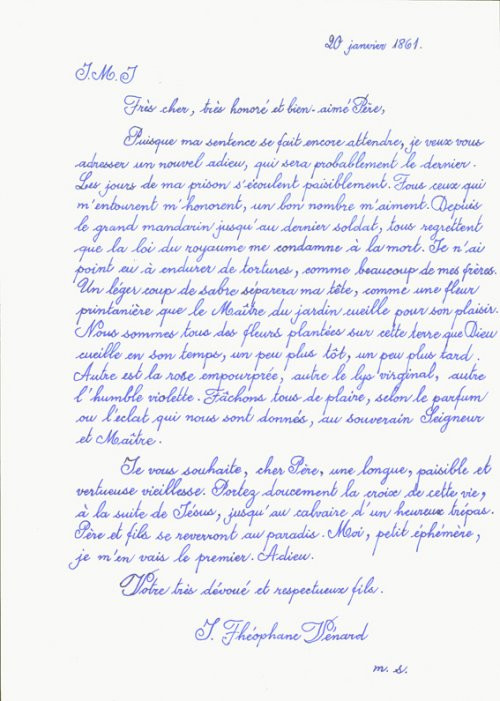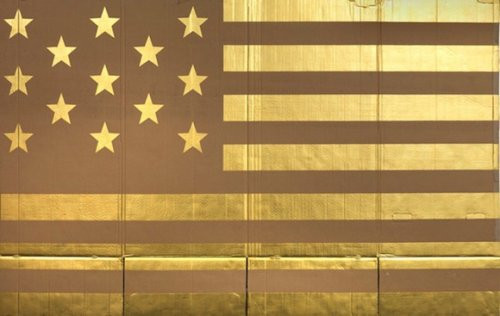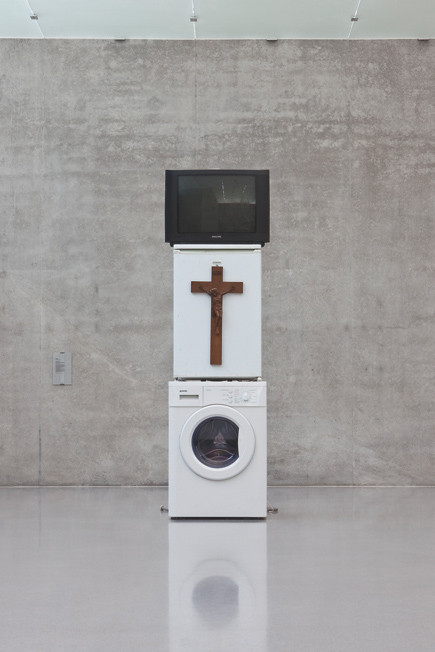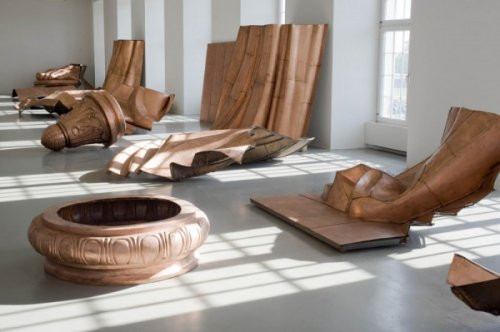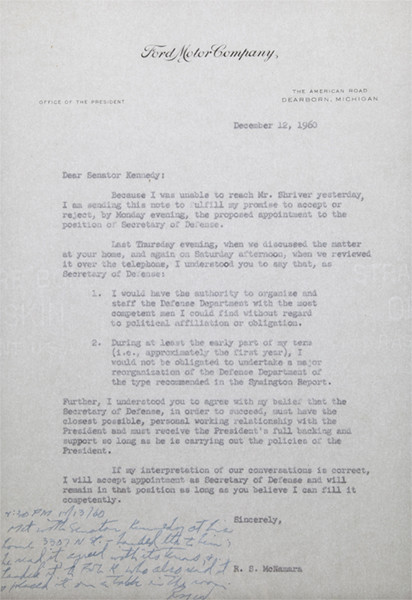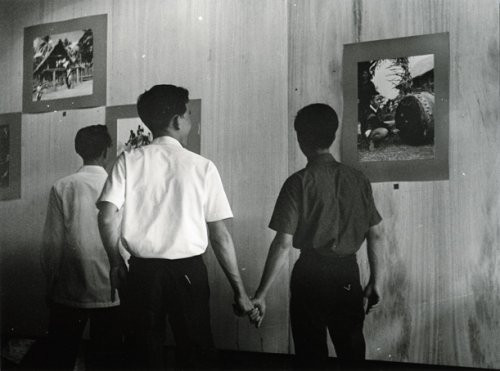Danh Vo
Published: May, 2013, ZOO MAGAZINE # 39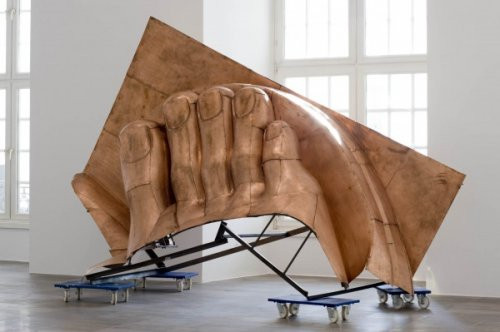
It’s not easy to pinpoint the secret of artist Danh Vo’s success: it could be the formal and conceptual richness of his oeuvre, the private point of departure that leads inexorably towards universal values as well as the combination between the comprehensible and the complex. We caught up with the artist between his three new exhibitions including the upcoming opening of the Venice Biennale.
Marta Gnyp: I would like to start discussing your artistic position through your work 02.02.1861, since it contains many aspects of your oeuvre. It is a letter in French that the missionary Théophane Vénard wrote to his father from his prison cell in 1861 just before he was decapitated in Vietnam. Your own father, who apparently does not understand French, copies this letter in his beautiful handwriting every time a collector of your work orders it through your gallery. So in a way, it is a limited edition that is only available until the death of your father. We are confronted here with a creation of an historical myth – a culturally sophisticated French missionary who is prepared to die for true religion is pitted against ruthless Asians who don’t understand the culture that has been brought to them. A lot of your work explores these symbolic and cultural hierarchies, would you agree?
Danh Vo: Well, I see my work also in a different way. Of course, these themes are always there, especially in this work where these possible relationships are visible, but for me it is such an important piece because it broke many rules.
MG: Which rules?
DV: I think it is successful because I collaborate with my father, who has nothing to do with the language of art; he engaged without understanding what or how he is communicating. It really functioned well because it managed to connect people through their differences.
MG: The relationship between you and your father forms one of the very intriguing aspects of this work. On the one side, you often mention that you admire your father because of his courage. (Danh Vo and his family, along with 100 other Vietnamese, fled Vietnam in 1979 through a plan organized by his father. The boat was intercepted by a Danish tanker that brought the Vietnamese to Denmark, where Danh Vo grew up.) In one of your interviews, you even said that you regret that you lack his radicalism. On the other side though, you let the whole art world know that your father doesn’t know what he writes, which is a kind of ignorance.
DV: No, he just never learned French. I never learned French either.
MG: Don’t you present him as an ignorant immigrant?
DV: I wouldn’t put it that way. There is more to it because have a profound respect for my father. But like in everyone’s relationship with one’s father or parents, there is a love and hate relationship. They want us to do something with our lives and have a vision for us. My father never liked that I was becoming an artist. He wanted me to be an engineer. So, there is all this complexity in it, and I think that is what makes the work compelling.
MG: Is there a kind of a personal revenge in the sense that you as an artist create work for him despite never having become an engineer?
DV: Yeah, I never wanted to be an engineer.
MG: What made you engage with your father for this project?
DV: I always knew about my father’s beautiful handwriting. What I was interested in, since my father never learned any kind of foreign language aside from Danish, is how the skill of writing that he learned in one place became a handicap in another place. Or put more precisely, it became a de-qualified skill. I have always thought these are very interesting elements in our society: what is it that decides what is valuable and what is not?
MG: How did your father use his skills in the new place?
DV: I saw all these examples of his writing when he had his burger shop. He loved to write the menus, like burgers and fries. More than this, my father had cheated on his taxes. He earned like two hundred euros per day so he would come home and rewrite the daily receipts. This was easy because he only made two hundred euros. When he retired, my sister got a sandwich shop where she would earn like 20 times more than he ever did. One day he asked her, ‘Phuong, do you want me to do your daily receipts?’ So he started to rewrite her receipts, but since she earned 20 times more than he did when he worked, it took him a whole day to rewrite them. It became this totally crazy family business because he wanted my brother to take all the original receipts to his country house to burn them but my brother did not want to participate. I was not living in Copenhagen at that time, so when I came back and discovered this situation, I had a fight with my brother because I didn’t think it was about taxes; it was about our father having something he could do, that he was good at doing for over 25 years. My father managed to remain active with his skills. The work 02.02.1861 is related to that issue. It’s about doing something that you are good at. That’s what creates the identification and anticipation in any sort of social intervention.
MG: This story of your father writing and rewriting the receipts makes the work, 02.02.1861, even more personal.
DV: Maybe it’s personal but it is also about what you observe through your daily life. The work couldn’t exist until I saw my father rewriting the receipts.
MG: Then you chose this letter by Vénard.
DV: I don’t think I searched actively for this letter. When I found the letter, everything made sense.
MG: How did you discover it?
DV: I found this letter when I was researching in the Foreign Mission Society. When I saw this letter I was immediately convinced that I could create this work.
MG: It just happened to you.
DV: Exactly. You discover something because you can see the potential in it.
MG: Is this also a way in which you became an artist?
DV: I don’t think I decided that. I went to art school without a conscious conviction.
MG: But before you went to art school, you decided you wanted to go to art school. So you felt that you do have special capacity for making art.
DV: A high school teacher said that I had a good sense of color and form. When you are 15 years old and you are not so good at many other things and somebody tells you that you are good at something, you go for it. I was making shitty paintings. I went into an art school and I thought, ‘what am I doing here?’ The first conscious choice was that I am not going to live as an artist because I thought that was about painting colors and form. But unconsciously, that was probably the first decision that made me into an artist. Because you have to deal with all these crafts that are imposed on you, like whether it is form or color or something else.
MG: I had the impression that you had a very clear vision of what you wanted from your art from the very beginning.
DV: This is not true. I have no clear idea of where I have to go. But that’s the beauty of it. I think that must be the most boring thing: to know where you are heading.
MG: When you finished at the academy, you started to make work that had nothing to do with what you call “shitty paintings” but which somehow related you to the world through objects and through symbols, using your own life as a point of departure.
DV: That comes from the idea that whatever you do, it should make sense to you, it should have a purpose for you; that is the first thing you have to trust.
MG: In which sense was art making sense to you? Was it a kind of personal investigation of your identity as a son of immigrants and as a gay man?
DV: It was about things that had meaning for me. I never had the idea that my art has to make sense to society. That is also the beauty of art – that you do what you think is important to you and that someone else might catch that; somebody that you don’t know, somebody that has no relation to you but still connects to it. I think that is really beautiful.
MG: It seems that from the very beginning of your artistic career you chose projects that made you visible, like the marriage project (since 2003, Danh Vo has been marrying and divorcing his friends and keeping his partner’s official name as his own), to mention an example. This is something that has given you visibility as an artist.
DV: I must say, I never really thought about it. Maybe I don’t remember well, but I think I ever thought about it. There was a certain provocation in my works but I never thought that people who would see the work would understand it.
MG: Is there a work of art you produced which has been especially important to you as an artist?
DV: If I had to mention a work that really changed my perception of things it would probably be the refrigerator, the TV, and crucifix of my grandmother (Oma Totem) because I never anticipated that people would be able to relate to such a thing. It was just a fridge and a crucifix. Objects that all of us are related to personally, but also objects that have the possibility of meaning something else. But meaning something else was something I would not fully understand. The objects were coming from my grandmother, whom I obviously know, but the life she had lived is so estranged for me. I can observe it and see it from a distance, but to really understand such a life is impossible.
MG: But on the other hand it functions perfectly on the symbolic level of something universal.
DV: We could all connect to it, but at the same time I think there is also the profound differences that lie in each individual. That is something that was important to my thinking.
MG: What about the project you made later – We The People – or your new show Mother Tongue in New York which presented objects once owned by the US Secretary of Defense, Robert S. McNamara that you bought at an auction? Are they based on the same logic?
DV: I think We The People was triggered by other motivations. I was labeled as an artist who works with personal issues, which I personally have never thought of that much; there were some works that referred to my private sphere but I think most of the objects I am using are familiar to anybody. Still, I wanted to make work that has nothing to do with my private life.
MG: For We The People you remade in fragments one of the most important western symbols – the Statue of Liberty. You used copper, a very expensive material, and you employed Chinese workers to make it. This is really a serious undertaking. Are you ever afraid of failure?
DV: Of course, this project was nerve-racking.
MG: Why do you think this project was so successful among collectors? Everyone wants to have a piece of your Statue of Liberty.
DV: That is difficult for me to answer. I did this project because it was a way of not referring to myself. There were many references to my work involved with marginalized groups and I hate to be put in a box. I always tried to work against things. It’s important for any production that we work with contradictions. So I wanted to do something that was “too much” and too big. And I did that, and it’s only from the previous experiences that you know what you want. So I still see it as a very conceptual idea and an empirical process.
MG: Do you make anything yourself with your hands? Creating the idea is essential but do you physically produce anything yourself?
DV: No. I should do what I’m good at. I don’t think it is so important that I have to produce it myself. If I were good at it, I would love to do it myself.
MG: Would you agree that having the commercial success that you now have has been always a part of your work?
DV: I think it should be. It is very easy to sit in the corner complaining because you don’t participate in it. I have seen too many of these people. I could sit there and say that I am not interested in commercial success, but how should we know unless we participate in this situation? We need to achieve different positions in order to understand what we really want with our lives.
MG: Would you love to be a very rich artist?
DV: I would like to try it for sure.
MG: Do you have a special relationship with collectors? I have the impression that through your work you give them the idea or the impression that they can understand something about the complexity of the post-colonial geopolitical situation and maybe about the personal and social complexity of immigrants and minor groups. Maybe you even manipulate the viewers by offering them the illusion of an understanding of complex social issues.
DV: I don’t believe artists should be a kind of Salvation Army. I don’t want to change peoples’ lives. I think it’s beautiful if people engage in a dialogue and whatever I am doing is an attempt to engage people in a dialogue. Whether it is students, colleagues, anyone who comes in to take a picture or collectors, there are amazing, intelligent people; there are also stupid ones. I just don’t see the world as a uniform thing. There are so many perspectives with which you engage one or the other way.
MG: I saw the images of your last show, Mother Tongue, in New York. What is your mother language?
DV: It’s Danish. My first mother language was Vietnamese, until I was four. But then I started kindergarten and started to speak Danish so my Vietnamese stayed at the level of a four-year old.
MG: So what do you speak with your father and your family?
DV: I speak a little Vietnamese. If I speak it regularly I can speak it. I don’t speak that often with my parents. It just gets worse and worse.
MG: Going back to your Mother Tongue show, I was amazed how you managed to fetishize in a beautiful way the historical objects of McNamara and J.F.K.; your interventions worked really well on the formal level, but also on a meaning providing level. The objects, which you dismembered, like the chairs, looked extraordinary on the wall. Would you say that you have a feeling for beauty?
DV: Chippendale chairs are the most unsexy chairs you could imagine. You just have to do something with them.
MG: How did this idea cross your mind?
DV: There are things that happen you just cannot think of. Like the fact that those objects owned by McNamara went into the auction. It is a coincidence that they escaped the presidential library unlike most of his other belongings. These things fall into your lap and then you have to grab your chance and to engage with them. If the auction happened five years ago, I wouldn’t have had the financial capacity to buy them. There were always these elements in my life that made works possible – something you cannot foresee. The same happened with black and white photos of Joe Carier. He took pictures of men holding hands while he was working in Vietnam between 1962 and 1973. He was gay and he was himself a part of the gay scene there. I met him when I was in residency in the US. He was clearly flirting with me. He is like 80-something, and if I had been five years younger at that time, I would have thought it was disgusting; I would have been offended by it. But at the time it happened, I thought it was really interesting that he was flirting with me while he was talking about his work in Vietnam during the whole war period. I didn’t construct the idea that for my work I would need an American soldier who worked in Vietnam for all these years and have all these stories. It happened.
MG: You were extremely lucky.
DV: I think so. I also think that because I have an open eye for these kinds of things I give them a possibility to happen. He asked me if I wanted to come to Vietnam with him, if I wanted to see Vietnam again. And I said why not? So we traveled to Vietnam together. It was only in Vietnam that I found out that he had these photos because in Vietnam we saw those guys holding hands and he would say that when he saw that for the first time in 1962, he was so shocked that he couldn’t help taking photos of them. I asked, what do you mean? Did you take paparazzi photos during the war? And he said yeah, they are all in my basement somewhere. So I traveled back to the US and then we cleaned out his basement and we found all these photographs.
MG: Hard to believe…
DV: Yes, life has all these amazing things existing. One should observe these things. Make use of them when they’re there.
MG: Well, on the one hand you observe, on the other you are doing a lot yourself. For example, your marriage project – you started to really do it, not only observing. And maybe from one thing it came to another thing. By the way, speaking about this marriage project, are you still doing it?
DV: No I stopped it. It was an important project because you had all these different bureaucratic institutions that attempt to define you through papers. It helped me very much not to take these kind of papers very seriously.
MG: What about your future projects? Do you have another big venture in mind?
DV: With We The People, I got a sense of what it means to make it and it was good to test myself out. I am not making a project of this scale anymore; it was a good experience, but it was not the way I want to live my life.
